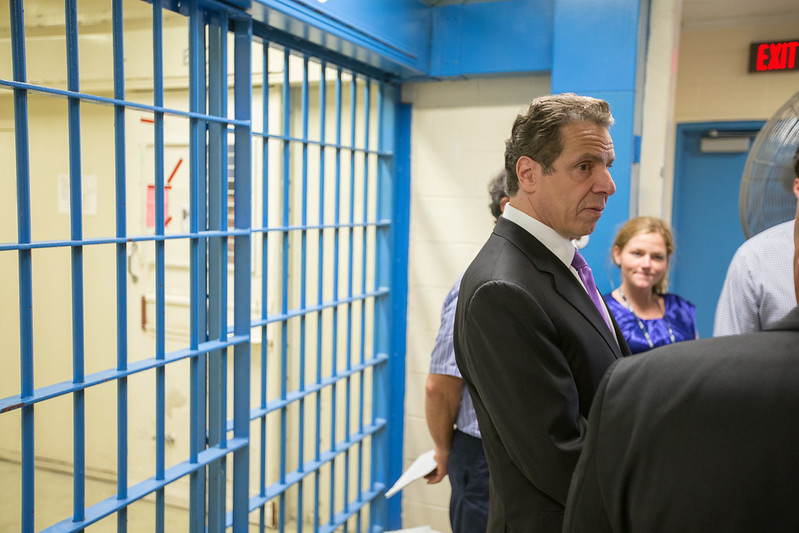
(photo: Governor's Office)
In 2015, New York Governor Andrew Cuomo announced a project to provide pro bono legal services to prisoners seeking clemency. The governor explained that this was “a critical step toward a more just, more fair, and more compassionate New York,” and that he sought to “identify those deserving of a second chance and to help ensure that clemency is a more accessible and tangible reality.”
Two years later, the governor re-emphasized his interest in clemency via a press release stating that “Family members of individuals serving prison sentences are encouraged to apply for clemency on behalf of their family member.”
This expressed interest in clemency, more specifically clemency in the form of a commutation of sentence, reverberated across New York’s patchwork of 50 state prisons. Men and women serving lengthy sentences with no chance of ever obtaining their freedom now had hope. People who spent their time wasting away in their cells began to re-engage with programs. Family visits reflected renewed promise of the possibility of unification beyond the prison walls.
In short order, CUNY Law School’s clemency project received more than 1,800 requests for help with clemency applications.
Yet not a single person had their sentence commuted in 2019 despite an abundance of robust and meritorious applications. Then on Friday, January 3, 2020 at 6:15 p.m., an auspicious time for any gubernatorial announcement, Governor Cuomo revealed that clemency requests for commutations had been granted to two people. Two people out of thousands of applicants.
Apparently, the promise of making clemency an “accessible and tangible reality” was nothing more than a cruel, soul-crushing hoax.
Placing the governor’s reluctance to commute sentences in context, consider that last November, Governor Kevin Stitt of Oklahoma, a Republican, signed off on commutations of sentences for 527 people. Earlier in the year, Governor Gavin Newsome of California, a Democrat, commuted the sentences for 21 people. In 2017 and 2018, then-California Governor Jerry Brown issued 49 commutations.
To be clear, the blame for the crying need for clemency -- for deserving people to get out from under massively long sentences -- lays at the feet of prosecutors and judges. Sentences like fifty, sixty, and seventy-five years to life, that foreclosed any chance of redemption, were routinely handed down in the 1970s, 1980s, and 1990s. As a result, there are almost 9,000 people serving life terms in New York prisons. Many of those people will die before ever being eligible to see a parole board.
The recognition that prosecutors and judges are the primary cause of death by incarceration sentences is precisely the reason that the unfettered power to grant clemency is enshrined in the state and the federal constitutions; all it takes for the governor to give someone a second chance is the stroke of his pen.
The executive’s power to grant clemency has deep historical roots dating back to biblical times when Pontius Pilate pardoned Barabbas instead of Christ. In British tradition, the monarch had the royal prerogative to grant pardons. Alexander Hamilton wrote in the Federalist Papers that in order to serve its humanitarian purpose, “the benign prerogative of pardoning should be as
little as possible fettered,” and that without the power to pardon, “justice would wear a countenance too sanguinary and cruel.” Hamilton argued that clemency allowed the executive to be a "dispenser of the mercy of the government."
In present terms, clemency is the most readily available means to repair the nationally acknowledged crisis of mass incarceration that has devastated communities of color. Mass incarceration is not just about unnecessarily incarcerating masses of people, but rather unnecessarily keeping masses of people in prison for decades. Clemency is a means to address that brutal reality.
Furthermore, while clemency is usually cast as an act of mercy, we all stand to gain when clemency is granted to deserving people. They are reunited with their families. They care for aging parents. They are the true credible messengers who mentor young people who might be on the wrong path. They have jobs and contribute to the economy. And the taxpayer no longer needs to pay for the medical care required for older people in prison, among other costs. Liberal application of clemency makes us all safer and better.
Many of the men and women who submitted clemency applications based on renewed hope inspired by Governor Cuomo’s words are now saying that false hope is worse than no hope. The wife of one of those men put it best in a tweet: “My husband wrote that he, his good friends, and more than 100 others sat on the edge of their metal beds all month [of December] waiting...PLEASE recognize the strides these men have made and show them mercy and use your redeeming power as the leader of this state.”
While clemency is typically cast as an end of year event consistent with holiday sentiments of mercy, charity, and forgiveness, surely there must be room for mercy, charity, and forgiveness more than once a year. And surely, there are more than two people among the 45,000 in New York State prisons who deserve the measure of mercy afforded by a sentence commutation.
***
Steven Zeidman is a professor of law at CUNY School of Law. On Twitter @SteveZeidman.
***
Have an op-ed idea or submission for Gotham Gazette? Email This email address is being protected from spambots. You need JavaScript enabled to view it.




